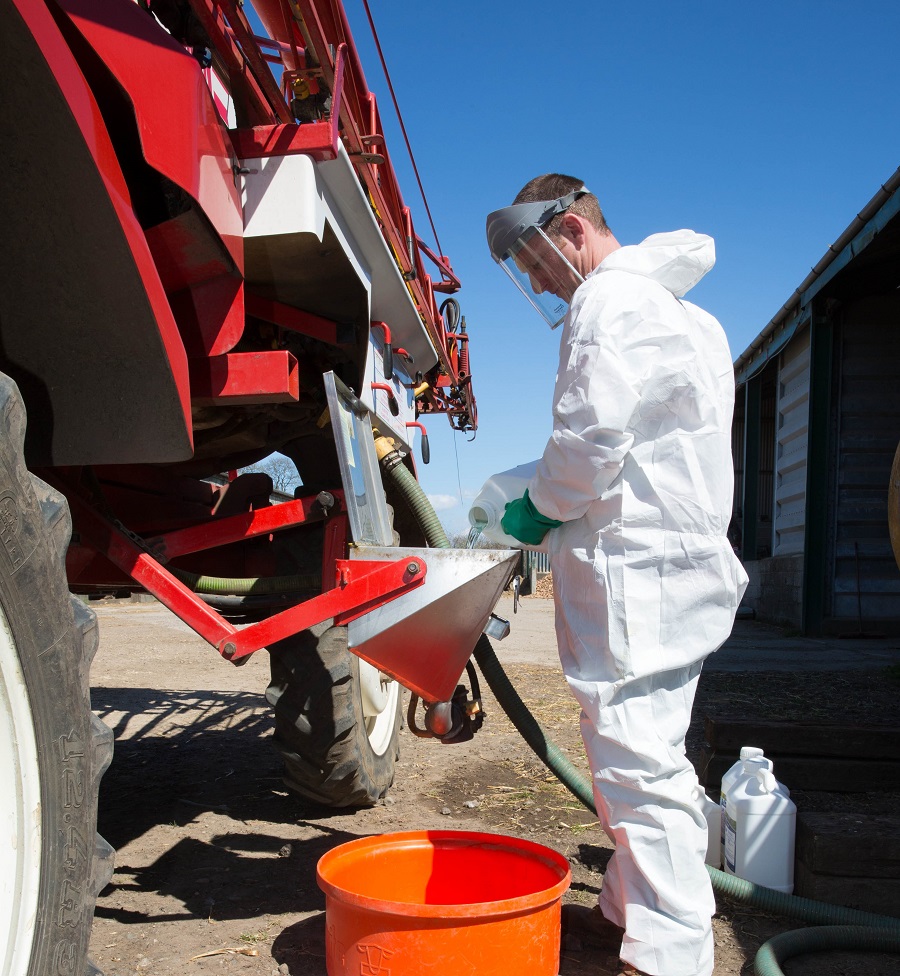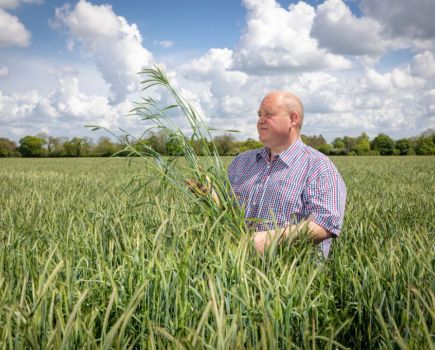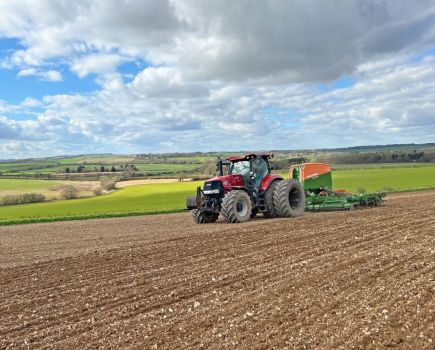Rarely has the supply chain come under as much pressure as it has over the past nine months, but a global pandemic was just part of it. CPM gets some insight from Britain’s biggest buying group on what lessons can be learned.
It’s a system that can ill afford to go wrong at the start of spring, just as arable farmers enter their busiest period.
By Tom Allen-Stevens
The nation may take for granted the people who look after its health and ensure a plentiful supply of food. But the many tributes paid to the NHS and #FoodHeroes during the coronavirus pandemic suggest that everyone’s nonetheless grateful that the system is coping.
For AF Group, it’s been the ultimate stress test in what was already proving to be a difficult season, according to business manager for crop production Martyn Rogers. “It’s the AF Group’s role to ensure its 4000+ members have all the supplies they need, when they need them, to bring a crop from seed to harvest. And COVID-19 bowled us something of a curved ball,” he says.

Once lockdown started, a skeleton staff kept the office open, but most of the team worked from home to ensure business as usual.
“Just keeping the office open was a challenge. Once lockdown started, we had to ensure orders were taken and deliveries fulfilled in exactly the same way as our members had come to expect from a normal service. We quickly kitted up for working from home, ensuring IT systems were adapted and secure, but also kept on a skeleton staff at the office – no one was furloughed.”
And there was much at stake – AF Group is the largest farmer-owned buying group in the UK with a turnover of crop protection inputs in excess of £100M. That puts it as the leading provider of products into the UK food chain. Martyn’s acutely aware that’s a system that can ill afford to go wrong at the start of spring, just as arable farmers enter their busiest period.
“We did get a bit of panic-buying to begin with – one or two growers putting in orders of over £100,000 of product to ensure they had everything they needed for the season in case the supply chain fell apart. But I think it’s sometimes overlooked that it’s our role as a buying group to be strategic and have a plan in place for every eventuality – we see ourselves very much as partners in the supply chain, not just providers.”
Martyn calls this a collaborative approach to buying that AF Group exercises on behalf of its members. It’s not a supplier itself, has no storage or warehouse facilities nor does the group deal directly with manufacturers. But the collective strength it has allows it to procure attractive deals on goods and services, saving members anywhere between 5-25% on crop protection inputs.
So how is this achieved? “As far as the member is concerned, they simply place the order with us and we’ll buy on their behalf from the supplier offering the best deals on that product. If the member orders a number of products, we’ll aim to order the whole delivery from the same supplier.”
Lying behind this is a detailed plan and a strategic relationship AF Group has built up with all its key suppliers and with manufacturers. This strategic approach was implemented by AF’s previous head of crop production Lindy Blanchard and has transformed how the group operates, says Martyn. The team has a pretty good idea how much of a particular product will be required through the season from previous years, regular surveys of its members and pre-orders. This information is relayed to suppliers who pass back updates on availability and price, which allows AF to place the orders appropriately.
“We have to be sure our members have received the right price. So at the end of the season we negotiate rebates based on the actual quantities purchased, and these are passed directly back to members.”
While the system works well with widely purchased products such as Roundup (glyphosate), Liberator (flufenacet+ diflufenican) and Adexar (fluxapyroxad+ epoxiconazole), a good knowledge of the market – what’s new and what’s falling out of favour – is essential, notes Martyn.
“We work closely with independent agronomists, and quite a lot of our member base now are farmers and farm managers who are BASIS-qualified. We spend a lot of our time gathering information to ensure we can anticipate member needs – what the favoured T1 fungicide option is, or how Arylex is fitting into herbicide regimes, for example. We tend to stick with the main brands or key generics rather than niche brands as these are the ones growers can rely on – maintaining trust is absolutely critical.”
What’s more, three buying groups in the north of Britain have recently joined AF Group, and the requirements of these members have had to be factored in. But some changes in the marketplace are much harder to predict. No amount of knowledge or understanding could have prepared the supply chain for the consequences of the weather events that have taken place over the past nine months, Martyn maintains.
“We had anticipated changes on oilseed rape – the area grown has been reducing and growers have cut back considerably on pre-emergence herbicides, spending more on the likes of Astrokerb (aminopyralid+ propyazamide) and Belkar (halauxifen-methyl+ picloram).
“But autumn plans on cereals just went out the window as the weather closed in. We’ve seen it before, in 2012, so had a fairly good idea what to expect once this happened. Orders of Avadex (triallate) and Crystal (flufenacet+ pendimethalin), for example, are returned while you have to gear up for a large requirement for sulfonylurea herbicides and Siltra (bixafen+ prothioconazole) as growers switch into spring barley.
“What we didn’t get in 2012, though, was the spring drought. When these changes occur, we work with suppliers to help members who want to return unwanted product, although much of it remains on farm. The main thing is to ensure none of our members suffer a bad deal as a result, and the rebate scheme provides that reassurance,” Martyn points out.
The regular surveys AF Group carries out with its members provide crucial feedback here, and allow the team to prepare for the upcoming season. Around 40% of members’ autumn herbicide requirement is still sitting in spray stores across the UK, for example, and this knowledge allows the team to plan this autumn’s campaign with suppliers.
But isn’t that valuable information in itself? “We’re very aware there’s a value to the data we hold on behalf of our members, in terms of their spend, the products they buy and when they buy them. Protecting that data is paramount, so at no point do we share members’ details with anyone, and have security systems in place to maintain this protection,” says Martyn.
“But aggregated data is very revealing in showing trends in SDHI use, for example – we know how much of the market individual manufacturers are likely to take. We can use that information as leverage to negotiate the best terms and secure the volumes we require. The focus is to ensure members benefit from the use of that data.”
But that benefit stops short of actually selling the aggregated data, for marketing purposes, for example. “We currently don’t have our members’ permission to do that, and it would have to be a positive decision by a majority before that changed,” he notes.
“It comes back to trust – farmers join AF Group because we’re impartial, independent and transparent. We’re not a commercial company looking to profit from farmers. But above all we work hard to understand their requirements and deliver on these.”
That comes from face-to-face contact with members – farm visits, meetings and the open days AF Group organises, says Martyn. “As a result of COVID-19 we’ve discovered new ways of working and meeting suppliers through Zoom, as well as taking part in virtual events. But the physical contact is one aspect I’ve missed and is really important, especially with new members. It’s the part of the service I hope we’ll resume shortly.”
Don’t lose your head when a product loses its approval
Managing use-up periods and winding down stocks when a product loses its approval is becoming an increasingly important role for the supply chain, notes Martyn. “The experience of chlorothalonil has been a real wake-up lesson.”
Product had to be on farm by 20 Nov last year, with a use-up period up to 19 May 2020. “Manufacturers clamoured for forward sales and there was appetite for these from farmers. We kept up regular communications with members to ensure they were aware of the best deals. Syngenta in particular were very sharp, placing a good volume of their products with attractive payment terms.
“But some generic companies came to the market with tens of thousands of litres as little as two weeks before the October deadline – it wasn’t a helpful way to ease planning.”
Members with CTL left on farm should get in touch with the AF Group team to arrange safe and legal disposal, notes Martyn. Meanwhile, epoxiconazole sales end on 31 Oct this year, with a use-up period to 31 Oct 2021.
“There are deals available, and BASF in particular is being very responsible in how it’s managing its products. Our advice to members is they don’t know what the weather will bring next year and there are alternatives available. So while there’s the opportunity to save money, don’t run the risk of buying more than you’ll use.”
A three-way partnership ensures security of supply
When Elveden Farms first joined AF Group 30 years ago it was to address an administrative need. But the relationship has developed with the business and adapted to the very different marketplace that exists today, says farms director Andrew Francis.
“We used to spend a lot of time bench-marking suppliers, so much of the attraction of joining a buying group was to reduce the six phone calls we’d make to source a product down to one. We knew we’d still benefit from the sharp pricing, but the there was an additional admin advantage of processing invoices from just one source,” he says.
The Elveden Estate lays claim to being the largest ring-fenced arable farm in lowland Britain. From its base near Thetford in Norfolk, Elveden Farms operates across a total of 7700ha, with arable operations in Cambs, Lincs and East Riding of Yorks. Cropping includes potatoes, onions, carrots, parsnips, vining peas, sugar beet, rye, wheat, winter and spring barley, oilseed rape and oats. 6% of the UK’s onions are grown at Elveden, and with an 800ha crop, along with 730ha of potatoes, just keeping up with crop protection requirements for these crops alone can be time-consuming, expensive and a logistical headache.
“The market’s changed, though,” notes Andrew. “The six different suppliers who’d meet our needs has consolidated to just two or three and the pricing doesn’t vary as much as it used to. But we benefit from the good relationship AF Group has with manufacturers.
“It’s absolutely critical to our business that we have security of supply, that the right product arrives on farm when we need it. With many of these products losing their approval almost on a monthly basis, we need to work with suppliers who can anticipate our needs – plan a use-up period and exit strategy from a product and source alternative options. AF provides that three-way partnership.”
AF Group’s speciality crops lead Amber Hewitt manages Elveden’s crop protection requirements. “Operating across a number of different sites, with a variety of winter and spring cropping, it’s crucial that products arrive at the correct time and location ahead of when required. A key part of my role is to stay ahead of the market and help plan and monitor their requirements,” she says.
That involves regular contact with manufacturers and suppliers, communicating updates back to Elveden. “We have a technical specialist on the team at AF who keeps us informed of any changes in the crop protection market, so we can adapt plans as soon as these are known.
“But this season’s been a challenge,” she admits. “Fortunately, Elveden were able to plant most of what they had already planned for the season, with some additional spring cropping. We had to move fast to adapt plans, and then when coronavirus hit, make sure we worked closely with our distribution partners to ensure supplies weren’t delayed or disrupted and a high level of service was maintained. Working with Andrew and the team is the most rewarding aspect of my role within the AF crop production team”
While Andrew’s not anticipating a fantastic harvest this year, all the crops have received the products he needed, despite the applications being quite different to what was originally planned. “As with any business, what makes life easier are the relationships you have with those you work with,” he says. “You have to be able to trust each other, especially with something as complex as crop protection inputs. The fact we’ve been with AF Group for 30 years is proof that relationship is working.”
Purchasing Partners
Coronavirus has brought to the fore the benefits of a supply chain that has integrity and reliability. Key to the success of an arable business is knowing who to trust and when price should give way to convenience.
In this series of articles CPM has teamed up with AF Group to provide some insight into how crop protection, fertiliser and other key inputs travel through the supply chain to the farm and looks at how some of the UK’s leading arable businesses ensure their inputs deliver exactly what they need to meet the challenges of agriculture today.
As the leading farmer-owned buying group, AF Group operates nationwide entirely for the benefit of its 4000+ members. Its small but experienced team have the expertise, not just to plan strategically and administer the purchasing choices of its members. It gives market insight to enable the best decisions to be made and works collaboratively to achieve maximum value – true purchasing partners.




